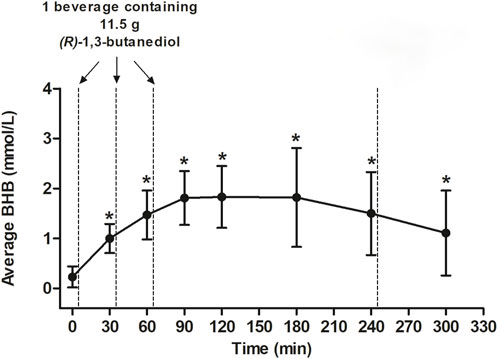Science

Harmless Buzz
Longevity™ doesn’t contain ethanol, the toxic compound in other alcoholic drinks that causes hangovers and health problems.

FDA-Approved
Longevi-T™ is made with a food-grade version of R 1,3 Butanediol, which is GRAS certified by the FDA.

Backed by Science
The health benefits of R 1,3 Butanediol consumption have been studied since the 1970’s.
R 1,3 and BHB
Recent studies demonstrate that R 1,3 Butanediol consumption raises BHB ketone levels in the blood.
BHB is considered a natural “longevity molecule,” and is the primary driver of the benefits associated with the ketosis diet.

A Note on 1,3 Butanediol Research:
1,3 Butanediol is a combination of (R)1,3 Butanediol and (S)1,3 Butanediol, and is much cheaper to produce. The human body can only process the (R) isomer of 1,3 Butanediol, making 1,3 Butanediol only 50% as bio-available as R 1,3 Butanediol. In other words, R 1,3 Butanediol is twice as effective in delivering the desired effects as 1,3 Butanediol. Before 2022, R 1,3 Butanediol was too expensive to mass produce, so most labs used 1,3 Butanediol to research the effects of the R 1,3 isomer.
Peer-Reviewed Research
Scientists have researched 1,3 Butanediols for decades. The following studies explore the positive health implications of consuming 1,3 Butanediols as a potential weight-loss therapeutic, carbless source of energy, anti-aging compound, ethanol detoxification agent, and healthy intoxicant.
Low-dose 1,3 Butanediol Reverses Age-Associated Vascular Dysfunction
With an aging global population, identifying novel therapeutics are necessary to increase longevity and decrease the deterioration of essential end organs such as the vasculature. Secondary alcohol, 1,3-butanediol (1,3-BD)…
The Neuroprotective Action of 1,3 Butanediol
1,3-Butanediol (BD) is converted in the body to β-hydroxybutyrate, and previous studies have shown that hyperketonemia had beneficial effects in experimental models of generalized hypoxia. The aim of this study was to determine if BD would reduce brain damage…
Leptin Sensitizing Effect and Weight Loss Applications of 1,3 Butanediol
Leptin is an adipocyte-derived hormone that regulates appetite and energy expenditure via the hypothalamus. Since the majority of obese subjects are leptin resistant, leptin sensitizers, rather than leptin itself, are expected to be anti-obesity drugs…
Nutritional application and implication of 1,3-butanediol
Research in the United States on synthetic sources of dietary calories was initiated in 1958 to develop high nutrient density food for extended manned space travel. Of many known compounds screened, 1,3-butanediol was the most promising…
(R)-1,3-Butanediol acutely increases BHB concentrations in adults
A study was undertaken to determine the acute effects of a beverage made with Avela™ (R)-1,3-butanediol, on blood beta-hydroxybutyrate (BHB) levels (using the Keto-Mojo monitor)…
Suppression of ethanol withdrawal syndrome by 1,3 Butanediol in rats
1,3-Butanediol was tested for its ability to suppress an ethanol withdrawal syndrome. Male Sprague-Dawley rats were rendered physically dependent on ethanol by intragastric administration of ethanol at a dosage of 9 to 15 grams per kilogram per day over a 4-day period. A nonintoxicating oral dose of 1,3-butanediol…
Science FAQ:
Yes. R 1,3 Butanediol, the active ingredient in Longevity™ is an FDA-approved food additive. It has been researched and consumed since the 1970’s. Based on this research, it is much safer to drink than normal ethanol alcohol.
Each can of Longevity™ contains 16 grams of R 1,3 Butanediol. This is enough to provide elevated BHB levels and a slightly euphoric buzz. Most people choose to drink at least 2 cans per session.
Food-grade R 1,3 Butanediol, the active ingredient in Longevi-T™, is FDA approved as a food additive.
No, legal regulations around drinking alcohol only apply to products containing ethanol. Because of this, alcohol-specific laws (such as drinking age and distribution licensing) do not apply to Longevity’s products.
Our alcohol ingredient, Longevi-T™, is considered a food additive and is regulated by the FDA.
We have elected to make Longevity 18+ because of its inebriating effects.
Each can of Longevity™ contains 16 grams of R 1,3 Butanediol. This is enough to provide elevated BHB levels and a slightly euphoric buzz. Most people choose to drink at least 2 cans per session.
Technically, no. R 1,3 Butanediol is a ketone, which the body uses as a natural source of fuel. Because of this, the FDA categorizes it as a calorie, even though it doesn’t behave like normal calories in the body.
Other than that, we do strive to keep Longevity™ as low-calorie as possible, avoiding added sugar and carbs.
We use simple, natural ingredients to flavor our drinks. Longevity Sonoran Paloma contains carbonated water, organic grapefruit juice, organic lime juice, Longevi-T (R 1,3 Butanediol and natural flavors), monkfruit extract, stevia extract, citric acid, and salt.
Try searching R 1,3 Butanediol studies on Pub Med.

